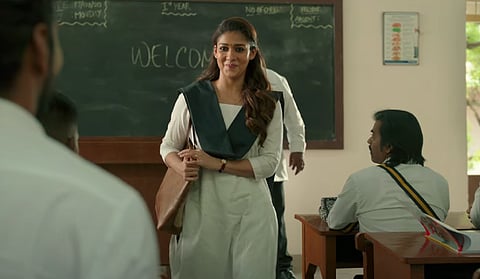Annapoorani review: Nayanthara is the soul of this slightly undercooked food film
Annapoorani (Tamil)(3.5 / 5)
“Biriyani ku ethu jaadhi madham. [Biriyani is beyond caste or religion.] It is an emotion,” says Annapoorani (Nayanthara), a conservative, dominant caste Brahmin woman vying to be one of the nation’s best chefs. While the dialogue itself is overused and not particularly radical, a much-loved superstar reiterating it on screen in times of divisive propaganda films like The Kerala Story feels like a welcome relief. Despite its mildly contradictory politics, Annapoorani: The Goddess of Food makes for a satisfying watch.
The story follows Annapoorani and her many trials and tribulations – her father and the general conservatism of their hometown Srirangam – to achieve her goal. Torn between familial affection and wanting to escape the suffocation of a small town, Annapoorani finds herself making difficult decisions that invite disapproval. The film not only sheds light on the struggles of women from small towns but also the gender disparity that exists in the culinary world. Writer-director Nilesh Krishnaa’s plot is time-tested and predictable, but there is a sense of personal triumph in seeing an underdog defeat all odds and emerge victorious, once again.
Nayanthara is the soul of Annapoorani. She skillfully embodies the range that the character demands - whether it is being terrified of disappointing her father or not hesitating to threaten an overbearing landlord. Jai, who plays Farhan, settles comfortably into being Annaporani’s cheerleader, a role usually reserved for women when a male protagonist is striving to achieve his dreams. While the relationship between Annapoorani and Farhan is unclear, there are some callbacks to Raja Rani (2013), the last time these actors shared the screen, which makes for good comic relief. The relationship between Annapoorani and Chef Sundarajan (Sathyaraj) affirms the warmth that can emanate from found families.
Among the medley of characters in the film, Subbulakshmi paati (Sachu), Annapoorani’s grandmother takes the cake. Be it taking digs at her son’s outdated views or speaking in favour of inter-religious marriages, Subbulakshmi paati is a breath of fresh air in the orthodoxy of Annapoorani’s family.
The cinematography in the film is a visual treat. Be it French gourmet dishes or Ambur biriyani, merely watching the food being prepared is enough to tantalise the audience. Thaman’s background score complements the film’s highs and lows, elevating the viewing experience and making it more immersive.
But the familiarity of the film’s plot is also what causes its undoing. Both Annapoorani’s meteoric rise in the extremely competitive culinary world and her challenges do not feel fully organic. Her inner conflicts seem to be quickly resolved rather than making room for introspection before a decision is made. There is a lot of ambivalence in Annapoorani’s relationship with Farhan as well. Perhaps director Nilesh Krishnaa did not want to risk offending religious fanatics who might call for a boycott if a Hindu woman is shown to love a Muslim man.
While the film does fairly well on the gender quotient, caste, and religious politics are played safe and appear a little perplexing. In a scene where chefs can cook whatever they wish to, Annapoorani deliberately contemplates a beef dish and chooses to finally make a vegetarian, South Indian thali. Scriptures are used to justify meat-eating practices and inter-religious marriage, but there is little questioning of the structures that have facilitated such discrimination.
Food habits and caste are inextricably linked in a country like India, and while the film does have a meat-eating Brahmin woman at its centre, there is little criticism of the ‘purity’ tag that is associated with vegetarianism. Annapoorani’s father Ranganathan is in charge of making prasadam at the Srirangam temple, and when he finds out that his daughter has been cooking and eating meat, he claims that it is as if he has been serving poison to devotees. Even though he is a product of his environment, there is little criticism of the casteist disdain and disgust for meat eating that is exhibited by the Brahmin characters in the film.
The film could have benefitted from being less ambiguous about where it stands and more assertive about what it wants to say.
Nonetheless, despite its imperfect politics and occasional logical fallacies, Annapoorani makes for a refreshing watch. The film is reminiscent of the wholesome, slice-of-life Tamil films before the era of big guns, ear-shattering explosions, and blood spill.
Disclaimer: This review was not paid for or commissioned by anyone associated with the film. Neither TNM nor any of its reviewers have any sort of business relationship with the film’s producers or any other members of its cast and crew.

